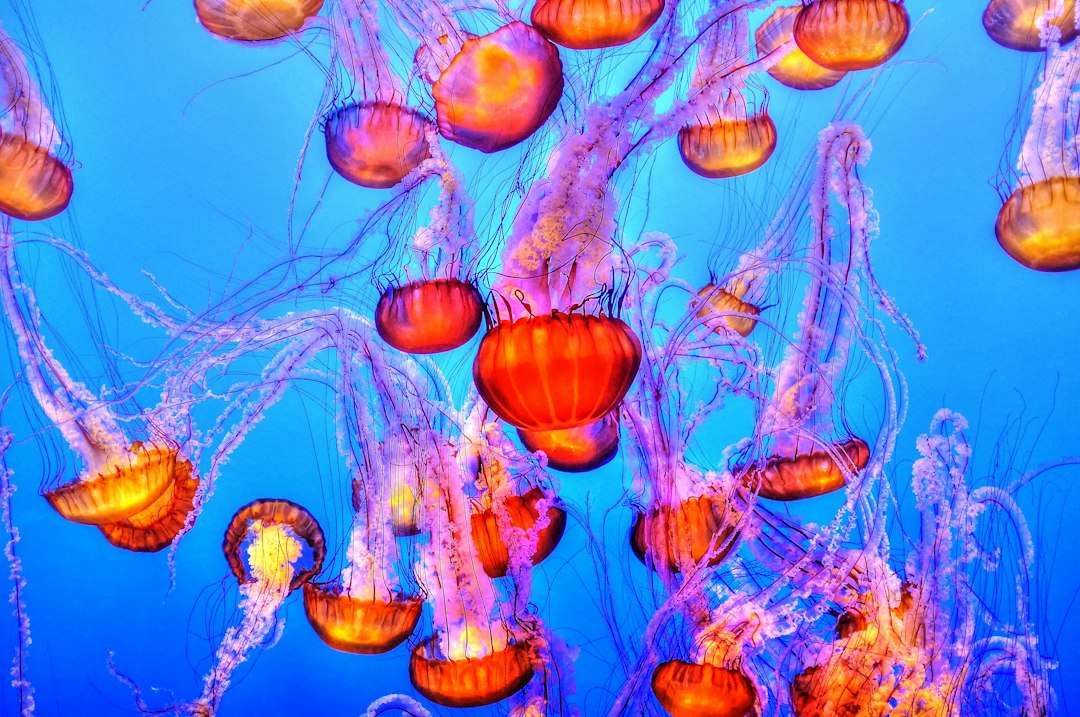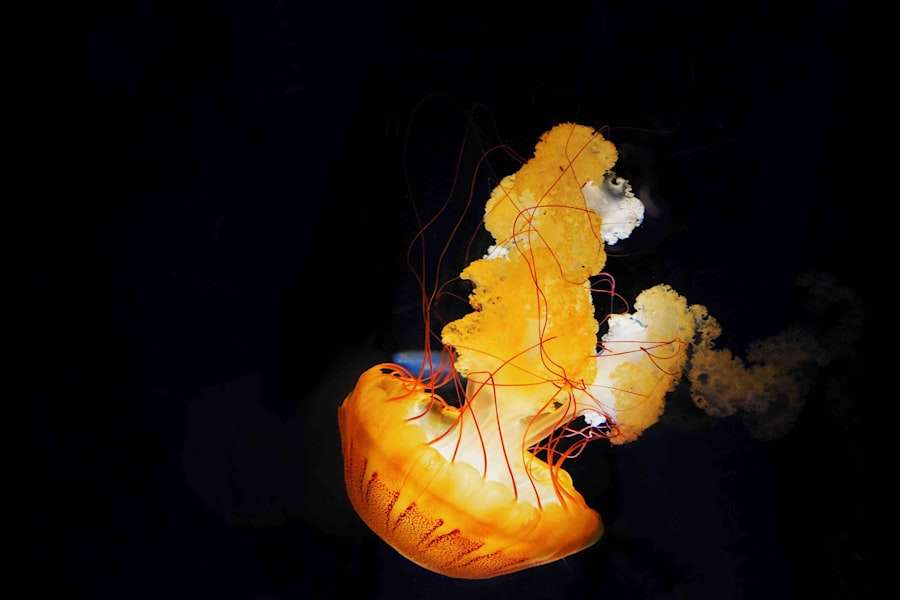The Mystical Symbolism of Jellyfish: Exploring the Meaning Behind These Enigmatic Creatures

Jellyfish are fascinating creatures that have captured the imagination of humans for centuries. With their translucent bodies and graceful movements, they seem to belong to a different world altogether. In this blog post, we will explore the symbolic significance of jellyfish in different cultures and how they can be seen as metaphors for personal growth, adaptability, healing, and more. By delving into the various meanings and interpretations of jellyfish, we hope to shed light on the enigmatic nature of these creatures and the enduring fascination they hold for us.
Key Takeaways
- Jellyfish have an enigmatic and mysterious quality that has captured the imagination of humans for centuries.
- Across different cultures, jellyfish have been seen as symbols of transcendence, adaptability, and the unconscious mind.
- Jellyfish are believed to possess mystical powers of healing and transformation, and are associated with the divine feminine.
- In literature and art, jellyfish have been used as symbols of beauty, danger, and the unknown.
- As we strive to protect our oceans and the creatures that inhabit them, jellyfish play an important role in environmentalism and conservation efforts.
The Symbolic Significance of Jellyfish in Different Cultures
Jellyfish have been viewed differently in various cultures around the world. In some cultures, they are seen as symbols of good luck and prosperity, while in others they are associated with danger and unpredictability. For example, in Chinese culture, jellyfish are believed to bring good fortune and wealth. They are often depicted in art and used as decorative motifs during celebrations and festivals.
On the other hand, in Japanese culture, jellyfish are often associated with danger and unpredictability. They are seen as mysterious creatures that can cause harm if not approached with caution. This belief is reflected in Japanese art and literature, where jellyfish are often depicted as powerful and otherworldly beings.
The Spiritual Meaning of Jellyfish: A Metaphor for Transcendence
Jellyfish can also be seen as symbols of spiritual growth and transformation. Their ability to move gracefully through the water, seemingly unaffected by external forces, can be seen as a metaphor for transcending the challenges and obstacles of life. Just as a jellyfish adapts to its environment and moves with the currents, we too can learn to adapt and flow with the changes that life brings.
This symbolism can be applied to personal growth and development. By embracing change and learning to let go of what no longer serves us, we can experience personal transformation and spiritual growth. Like a jellyfish, we can learn to navigate the currents of life with grace and ease, finding our own path and purpose.
Jellyfish as a Symbol of Adaptability and Resilience
| Category | Metric |
|---|---|
| Physical Characteristics | Gelatinous body, umbrella-shaped bell, tentacles with stinging cells |
| Adaptability | Can survive in a wide range of water temperatures and depths |
| Resilience | Can regenerate lost body parts and survive in low-oxygen environments |
| Ecological Importance | Provide food for many marine animals and help control populations of other species |
| Cultural Significance | Symbol of adaptability, resilience, and transformation in various cultures |
One of the most remarkable characteristics of jellyfish is their ability to adapt to changing environments and survive in harsh conditions. They are able to withstand fluctuations in temperature, salinity, and oxygen levels, making them incredibly resilient creatures. This adaptability can be seen as a symbol of resilience and strength.
In our own lives, we often face challenges and setbacks that require us to adapt and find new ways of thriving. The ability of jellyfish to survive in even the most inhospitable conditions can serve as a reminder that we too have the strength and resilience to overcome obstacles and thrive in any situation.
The Mystical Powers of Jellyfish: Healing and Transformation
Jellyfish have long been associated with healing and transformation in traditional medicine and healing practices. In some cultures, jellyfish are believed to possess mystical powers that can bring about physical and emotional healing. They are used in traditional remedies for various ailments, such as arthritis and skin conditions.
This symbolism can be applied to modern healing practices and personal transformation. Just as jellyfish have the ability to regenerate their bodies when injured or damaged, we too have the power to heal and transform ourselves. By tapping into our own inner resources and embracing the process of healing, we can experience profound transformation and growth.
The Connection between Jellyfish and the Divine Feminine

In many cultures, jellyfish have been associated with goddesses and feminine energy. They are often seen as symbols of fertility, creativity, and the power of the feminine. This connection between jellyfish and the divine feminine can be seen in various mythologies and religious beliefs.
In modern understandings of femininity and gender, the symbolism of jellyfish can be applied to the power and strength of the feminine. Just as jellyfish possess a unique beauty and grace, so too do women possess their own unique strengths and qualities. Embracing the symbolism of jellyfish can help us tap into our own feminine power and embrace our true selves.
Jellyfish as a Symbol of the Unconscious Mind and Dreams
Jellyfish can also be seen as symbols of the unconscious mind and the mysteries of the dream world. Their ethereal appearance and elusive nature make them perfect symbols for the depths of our own subconscious. Just as jellyfish move through the water with a sense of mystery and grace, so too do our dreams and unconscious thoughts move through our minds.
By exploring the symbolism of jellyfish, we can gain insight into our own unconscious minds and better understand ourselves. The mysteries of the dream world can offer us valuable insights and guidance, if we are willing to delve into them.
The Symbolism of Jellyfish in Literature and Art
Throughout history, jellyfish have been used in literature and art to convey various meanings and interpretations. In literature, they are often used as symbols of beauty, mystery, and otherworldliness. In art, they are depicted in various forms, from delicate watercolor paintings to intricate sculptures.
The various meanings and interpretations of jellyfish in literature and art reflect the enduring fascination with these creatures. They continue to captivate artists and writers alike, inspiring them to create works that explore the enigmatic nature of jellyfish and their symbolic significance.
The Role of Jellyfish in Environmentalism and Conservation
Jellyfish play an important role in maintaining ecological balance in marine ecosystems. They are often referred to as “indicator species” because their presence or absence can indicate the health of an ecosystem. However, human activity has had a significant impact on jellyfish populations, leading to imbalances in marine ecosystems.
Conservation efforts are crucial to protect jellyfish populations and maintain the delicate balance of marine ecosystems. By understanding the importance of jellyfish and their role in the environment, we can work towards preserving their habitats and ensuring their survival.
The Enduring Mystery of Jellyfish and Their Symbolic Significance
In conclusion, jellyfish are enigmatic creatures that have captured the imagination of humans for centuries. Their unique characteristics and graceful movements make them perfect symbols for various aspects of life, from personal growth and transformation to adaptability and resilience. The symbolic significance of jellyfish can be seen in different cultures, literature, art, and even in our own personal journeys.
By exploring the various meanings and interpretations of jellyfish, we can gain a deeper understanding of ourselves and the world around us. The enduring mystery and fascination with these creatures remind us of the beauty and complexity of life, and the importance of preserving the delicate balance of our natural world.
If you’re interested in exploring more symbolism, you might find the article on the Symbolism of the Star fascinating. Just like the jellyfish, stars have been imbued with deep meaning throughout history. From representing guidance and inspiration to symbolizing hope and spirituality, stars have captivated human imagination for centuries. To delve into the rich symbolism of stars, check out this insightful article on SymbolismHub.com.
FAQs
What is the symbolism of jellyfish?
Jellyfish are often associated with the concept of adaptability, as they are able to survive in a variety of environments and conditions. They are also seen as symbols of balance and harmony, as they move gracefully through the water without disturbing their surroundings.
What do jellyfish represent in different cultures?
In some cultures, jellyfish are seen as symbols of danger and unpredictability, while in others they are associated with good luck and prosperity. In Japanese culture, jellyfish are often depicted in art and literature as symbols of beauty and grace.
What is the spiritual meaning of jellyfish?
Jellyfish are often seen as symbols of spiritual growth and transformation, as they are able to regenerate their bodies and adapt to changing environments. They are also associated with the concept of surrender, as they move with the currents of the ocean without resistance.
What is the significance of jellyfish in mythology?
In Greek mythology, jellyfish were said to be the offspring of Medusa, the Gorgon with snakes for hair. In some Native American cultures, jellyfish were seen as messengers from the spirit world, bringing important messages and warnings to the living.
What is the scientific significance of jellyfish?
Jellyfish are important indicators of the health of marine ecosystems, as they are sensitive to changes in water temperature and pollution levels. They are also used in medical research, as their unique regenerative abilities may hold the key to developing new treatments for human diseases.





